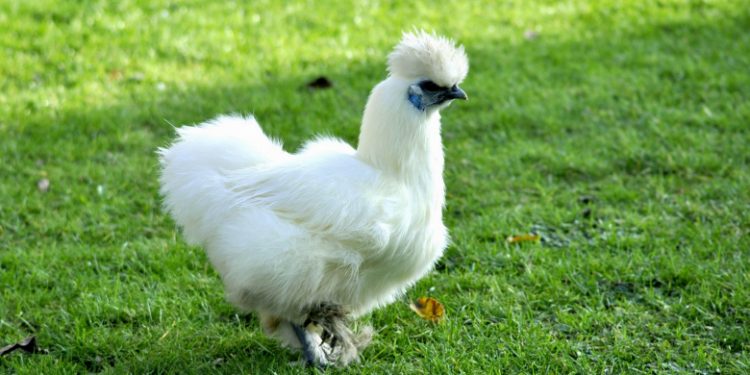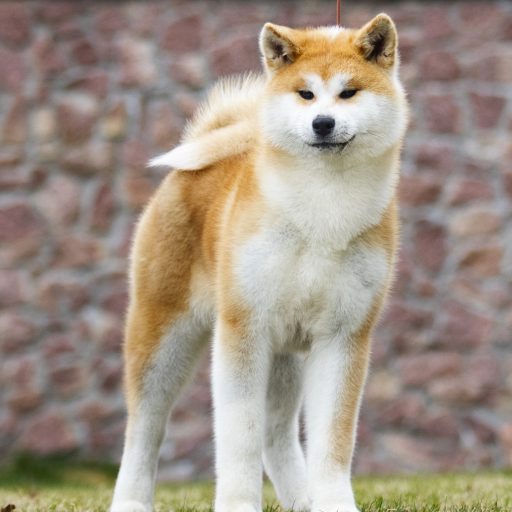La Poule Soie is one of a kind. As much for its unusual plumage which looks like fur, as for its loving character coupled with an extraordinary maternal instinct. It is not a large layer, but you will not regret welcoming it into your chicken coop.
Physical peculiarities
Beneath their fluffy feathers, you may be surprised to find that the Silkie is all black: its skin, muscles and bones. The only exception is blood that remains red.
Egg template: 45/55g. Cream to brown colored shell.
Plumage: unpatterned fur-like feathers. Black, white, fawn, blue, silver partridge, golden partridge, grey, splash, cuckoo.
Eyes: very dark, almost black irises.
Beak: small, arched, grey.
Crest: no crest. It is replaced by an outgrowth of flesh on which grows its crest, the same color as the plumage.
Chest: full and developed.
Mumps: small, blue-turquoise.
Tarsi: medium, fully feathered, 5 toes.
Behavior and character
If you are looking for a friendly and gentle breed as a first hen for your children or as a pet for yourself, you may have just found the perfect hen.
Silky hens are exactly as they look: funny, cuddly and very kind. They are one of the friendliest breeds that will appreciate your attention and company.
Even roosters are disconcertingly docile. The friendliness of the Silkie can even lead to it being roughed up by other members of the coop. They are happiest when they share their enclosure with other hens of a similar nature, such as the Padua hen.
Feed
Even if its egg production rarely exceeds 3 eggs per week, the Silkie Hen can be fed with pellets for layers or a classic diet for hens, namely: Mixed cereals, oilseeds and protein crops, as well as a source of calcium.
As a supplement to their diet, fresh green vegetables and a few occasional treats will be welcome. They will stay happy, active and healthy.
Reproduction
If the Silkie does not lay many eggs, it is also because it stops laying during the summer to enter the brooding period. She is the queen of brooders and a very good mother. Her maternal instinct is so developed that she can even act as a surrogate mother for the chicks of other hens, or even other species!
Health
Unfortunately, the Silkie is of a rather fragile nature. She can be very susceptible to Marek’s disease. Many breeders have tried to stimulate their natural immunity, but of course you can have your hens vaccinated to avoid this kind of problem.
Since these hens have very fluffy plumage, they can also be the target of mites, lice and leg mange. Special care must therefore be taken with these small balls of feathers. You may also need to trim the feathers around the eyes to help them see better, and sometimes those behind them for hygienic and reproductive reasons.
Place of life
It is quite common for Silkie hens to live in confinement, they are also one of the few hens who would be happy to be kept in an apartment. But you can of course raise them outdoors, they love to peck the ground in search of insects or young shoots of weeds. The grassy area in which they dig must, on the other hand, be a real haven of peace, well secured, because they cannot fly to escape predators and they do not run very fast either. It is this provided, but sparse plumage, which prevents them from flying. The advantage being that the barriers will not have to be very high.
You can therefore keep them in an enclosure, as long as it is dry and free of mud. They tolerate heat quite well, but cold quite badly, despite their thick “fur”. If your climate is very cold in winter, do not hesitate to give them a little extra heat.
Their worst enemy is humidity. In case of rain, their shaggy plumage collapses and sticks to their skin, so that there is a very good chance that they will fall ill.
Breed History
Silkies have a long and rich history. There is a lot of information about this breed, and traces of its existence in ancient Chinese writings. Eastern cultures have always believed that the silk hen has extraordinary medicinal properties, especially against aging. This belief is partly justified: recent studies have found that the Silkie produces more Carnosine, an antioxidant, than other poultry. It is for this reason that it is still widely used today in Chinese medicine.












